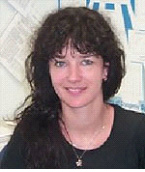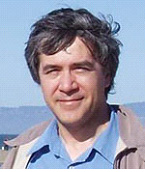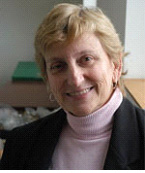Newly Elected to the FIP Executive Committee
Compiled by E. Malamud from excepts from the candidate bios and statements




From L to R: Ed Berger, Christine Darve, Alex de Lozanne, and Noemi Mirkin
Edmond L Berger, Distinguished Fellow at Argonne National Laboratory was elected to Vice–Chair and the 4-year Chair Line term beginning in January 1 of this year.
Ed Berger is an elementary particle theorist in the High Energy Physics Division of Argonne National Laboratory. He earned an undergraduate degree in Physics from MIT and a PhD from Princeton University. Berger has served as a member of the High Energy Physics Advisory Panel and on several DOE review committees, on the Fermilab Physics Advisory Committee, and on the Brookhaven High Energy and Nuclear Physics Advisory Committee. He was elected twice to the Executive Committee of the APS Division of Particles and Fields, serving as Chair of the Executive Committee in 1990. He has been very active in the organization of major international meetings.
Berger eloquently states. “As members of the Forum on International Physics of the American Physical Society, we are self-selected individuals brought together by our special interest and experience in international relations among physicists. Born and educated in diverse nations, we have worked and traveled elsewhere and may well make our contributions in societies far from our original homelands. We are bound by our appreciation of the open culture of the scientific enterprise, and we want to “give back” by facilitating scientific opportunities for aspiring students in regions not yet fully represented in the field.”
Berger is concerned with access and sharing of unique physics faculties, and also feels that FIP can be proactive in the transfer of more facilities to developing nations, and in the organization of appropriate workshops and summer schools, partnering with educational and philanthropic organizations who share the goal of fostering the growth of science and technology in underrepresented regions.
The two new Members-at-Large on the 13-peson FIP Executive Committee are Christine Darve and Alex de Lozanne. Their 3-year terms began on January 1 of this year.
Christine Darve is an Engineering Scientist at the European Spallation Source in Lund, Sweden. She specializes in accelerator physics. Darve graduated from the Institut Polytechnique de Sevenans (France) in 1996 and after a decade of experience in the field of cold temperatures she obtained her Ph.D. at Northwestern University (Illinois) on the topic of the superfluidity of helium. Darve has been involved in schools and workshops to promote science without barriers, academic freedom and human rights. She has been the main organizer of the African School on Fundamental Physics and its Applications (ASP). The mission of this bi-annual 3-weeks school is to build expertise in the least developed countries and to increase proficiency in applied science and technology. Darve has developed strong connections with international physics institutes and African Universities to continue her efforts in bringing science and technology to the reach of African students and young scientists.
As a Member-at-Large Darve will organize events which foster international science. Since early in her career Darve has been an advocate of improving international collaborations. She was the executive secretary of Physics Without Borders and supported the establishment of a summer school in Sarajevo, where 100 students from the Balkan area discovered the use of the World Wide Web. Her future goals are to encourage programs with diversity and promote science and society without barriers.
Alejandro (Alex) de Lozanne is a professor in the Department of Physics at the University of Texas at Austin, where he has been a faculty member since 1985. Previously he held a junior faculty position in the Department of Applied Physics at Stanford University after receiving a Ph.D. degree in Physics from that institution in 1982.
De Lozanne studies magnetism, superconductivity and nanostructures, using low temperature scanning probe techniques that he has developed. He has published two patents and 130 papers or book chapters on these topics. His research has been recognized with several fellowships and a 1986 Presidential Young Investigator Award. He was born in Sonora, Mexico, and grew up in Mexico City.
De Lozanne is concerned with dwindling resources and his perception that interest in physics among young people seems to be waning, As a Member-at-Large he wants to explore new ways to carry out the objective of the FIP to promote “the advancement and diffusion of the knowledge of physics by fostering communication and mutual understanding among physicists of all countries.” He would like to explore the possibility of fostering exchanges via the internet. Some subfields, like experimental high energy physics, have plenty of experience in communicating with large groups of collaborators across the globe. Perhaps FIP can host and promote similar collaborations in other subfields.
Noemi Mirkin continues for another 3-year term as our Secretary-Treasurer.
The Secretary-Treasurer in APS units is the person most responsible for the smooth running of the unit, and provides continuity as the Chair changes annually. FIP has benefitted enormously from having Mirkin as our Secretary-Treasurer and we are indeed fortunate that she is willing to continue in that role.
Noemi Mirkin was born in Buenos Aires, Argentina and received her Licenciado degree in Physics from the National University of Tucuman in 1973 and her Ph.D. in Physics from the University of Michigan in 1989. Mirkin's research has been in the general area of vibrational spectroscopic studies of peptide and protein structure and have included a variety of topics in experimental infrared and Raman spectroscopy; vibrational analysis; surface enhanced Raman spectroscopy; quantum chemical studies of structures, energies and force fields of macromolecules; the development of physically reliable molecular mechanics energy functions to be used in the modeling of biomolecules.
She has been deeply involved with multiple organizations in activities geared to increasing the participation of women and minorities in science and engineering. She was awarded the University of Michigan's Sarah Goddard Power Award for scholarship, leadership and sustained service on behalf of women. She served as member and then Chair of the APS Committee on the International Freedom of Scientists.
Mirkin feels that FIP’s greatest opportunity and challenge is to increase our membership base. “To remain a healthy organization we not only need to recruit more members, but also to increase member participation at all levels. In addition, we need to strengthen the communication between the FIP Executive Committee and the FIP members; our members need to know what our organization is doing and how it affects them. It is important for the FIP to maintain a strong presence in matters of international issues. We must represent and bring to the forefront the interests of the foreign members of the APS. In this ever-changing world environment, the FIP has the opportunity to play a unique leadership role towards enhancing international cooperation in scientific research and technological development. Critical issues at this time are the barriers to the free flow of information and communication with international scientists. We must be aware, vigilant and proactive in maintaining these freedoms.” Mirkin will continue to work for the FIP in its efforts to provide a forum that supports and encourages scientific interactions in the international community.
Disclaimer - The articles and opinion pieces found in this issue of the APS Forum on International Physics Newsletter are not peer refereed and represent solely the views of the authors and not necessarily the views of the APS.
